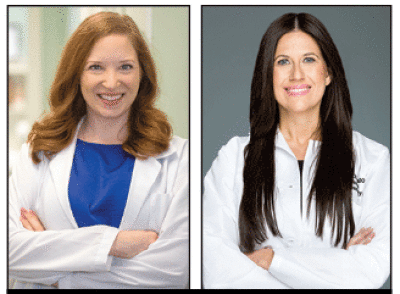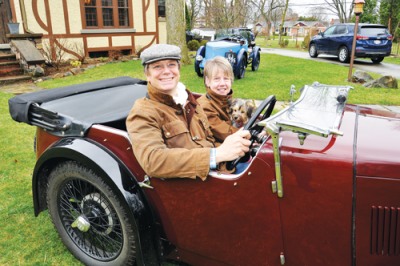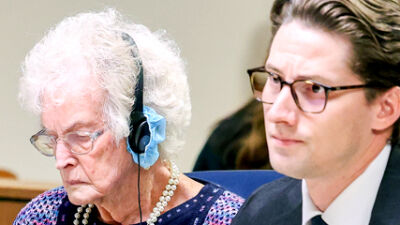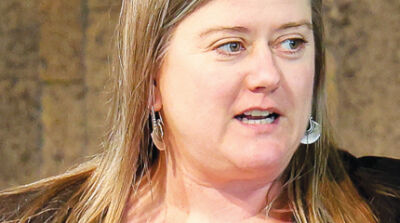
LEFT: Dr. Tiffany Inman opened the doors of Inman Audiology in September 2020. Photo provided by Dr. Tiffany Inman RIGHT: Dr. Elizabeth Pensler’s private practice is Pensler Vein and Vascular Surgical Institute. She also runs Elizabeth Face and Body Med Spa. Photo provided by Dr. Elizabeth Pensler
METRO DETROIT — Recent years have seen an increasing number of women pursuing medicine. According to a data report from the Association of American Medical Colleges, 2019 was the first year more women were enrolled in medical school than men.
While the movement of women in medicine is improving representation in hospitals, many women in medicine have experienced the practice of being treated as less than their male counterparts.
Dr. Tiffany Inman, the owner and director of Inman Audiology, said she has witnessed it.
Inman received a doctorate degree in audiology from Western Michigan University and earned her Certificate of Clinical Competence in Audiology from the American Speech Language and Hearing Association.
While women were often the majority in her audiology program, Inman said the male students were treated like the “shining stars.”
“The preference was for the male students. They were the ones that got to come back after they graduated to be a speaker. They were the ones that got the preferential placements. They were the ones that were heard,” Inman said.
As she was going through classes, her method was to keep her head down and do what she had to do to be a good student.
“It’s hard enough studying to get an advanced degree, but doing so knowing that you already have these biases built into the system was complicated,” Inman said.
Once she started working clinically, Inman decided that, if she was going to achieve everything she wanted to achieve, she needed to be exceptional. As she was working two jobs, she would constantly practice so that she could stand out.
“I did what I needed to do during clinical rotations to get the knowledge and the expertise that I wasn’t getting in the classroom. And it worked. My preceptors were amazing, and I learned so much from them that I didn’t learn in the classroom,” Inman said.
Inman said that it was especially difficult for her 50-year-old female classmate, who she said often was treated like she was invisible.
Following graduate school, Inman worked with 14 male coworkers in a university physician group. She said that, while she was fortunate to have one neurotologist who was respectful and taught her valuable information, the rest of the ENTs would throw their paperwork at her and have her alphabetize their files.
Once this group disbanded, she began working at a private practice with a male ENT who she said created a culture that made it very difficult to be a woman in that office, despite what she had done to grow the practice.
Once the pandemic hit and student loan payments went on hold, Inman decided to open her own private practice. She opened the doors of Inman Audiology in September 2020.
“Because, if I could do this for him, I could certainly do it for myself,” Inman said.
After experiencing it herself, Inman said she can recognize when patients have been neglected by people in the medical field and is able to talk to them in a way that makes them feel seen.
“Seeing a woman practitioner and seeing somebody that has also been through it, I think it really does help a patient open up and helps them trust me, because I’ve seen it. I’ve been there. I’ve worked with people who tell people that,” Inman said.
Dr. Elizabeth Pensler — of Pensler Vein and Vascular Surgical Institute, and Elizabeth Face and Body Med Spa — can also speak to experiencing disrespect as a woman in the medical field.
Pensler went to medical school at Kansas City University of Medicine and Biosciences, completed her general surgery residency within the Henry Ford Health System and her vascular surgery fellowship at Wayne State University/Detroit Medical Center.
Pensler knew from a very young age that she wanted to work in the medical field.
“Once you get into medical school, you can kind of tell the difference about what professions men should go into versus women should go into, and I think surgery, even though there are female surgeons, I still believe it’s a very male-dominated field,” Pensler said.
Surgery is one of the medical specialties where women are still in the significant minority, according to the Association of American Medical Colleges.
Pensler said she experienced people trying to steer her away from specializing in surgery because she is a woman.
While she said she felt like she had to work twice as hard, she persevered.
Pensler is now an accomplished vascular surgeon who is board certified, but she still feels like she is often looked at as inferior to men due to preconceived notions people have about women in medicine.
“You are kind of competing with people just believing that men are better or smarter or more capable,” Pensler said.
Pensler and Inman both recommend that women in medicine find a good mentor who will give advice to navigate them through the profession.
 Publication select ▼
Publication select ▼




















